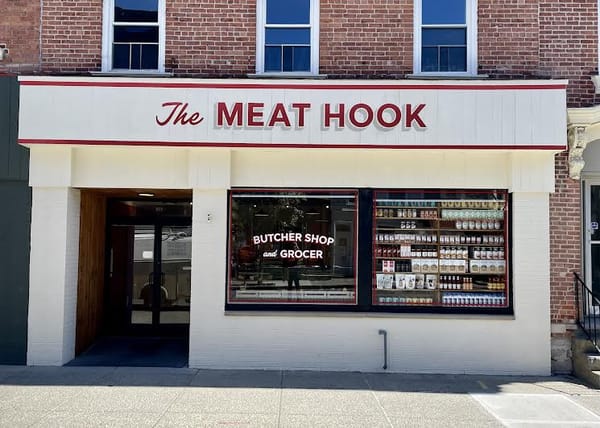
Peter Davies and Mark Scherzer are the owners of Turkana Farms in Germantown, NY. This week Mark writes: You may think I'm suffering from a case of eater's remorse, but in fact even before the recent holiday, I was giving a lot of thought to how we can seem to live in a land of such plentiful food, yet we have heard so much news in the past couple of weeks about "food insecurity." It's an unfortunate term, bureaucratese for "hunger." The news is that a significant number of people in the U.S. have trouble staying adequately fed. It's a troubling thought. Remember what you were taught growing up were the essential characteristics of America? One was that this is the Land of Plenty. The land that, as Emma Lazarus wrote, could throw open its welcoming arms to the world's tired and hungry. Our productive farms produced not only enough to make us incredibly well fed, but also enough to export to feed much of the rest of the world. Many of us have clearly carried this ideal of unbounded plenty into adulthood. In my day job, I have closely followed the debates over health-care reform for over two decades now. The health care dilemma we face, widely accepted as a problem in dire need of fixing, is that 47-million Americans, by latest estimates, lack health insurance and, consequently, dependable access to health care. The uninsured get sicker and die earlier than people with insurance. In these 20 years of debate, I've repeatedly heard opponents of a governmental solution to the crisis claim that the free market system is the most effective way to give everyone access. Their Exhibit A in support of that argument is almost invariably the agricultural sector. Look, they say, how private business has made plentiful food available to everyone. Imagine, they say with a warning shudder, what would happen if we put the government in charge of the food supply? I never had a ready response to that argument. Partly because I lacked enough knowledge of government agricultural subsidies and the links between big agribusiness and government. But mostly it was that I shared the operating assumption of the anti-government types: we live in a land of plenty where the diet of the poor might not be as healthy as it should be, but they certainly are not hungry. Hunger? Not here. Well, it is here. The government study on "food insecurity" reported that nearly 49 million Americans lack secure access to adequate nutrition. About 16 million of these, including half a million children, have to skip meals, or even a full day of eating, for lack of adequate resources. The other two thirds are able to eat by some combination of altering their diets to cheaper foods and relying on private charity or government help. The sheer number of hungry people is stunning, but equally striking to me is the rough equivalence of that number with the number of uninsured people. It would not surprise me, indeed, if the uninsured are more often than not the same low-wage earners who are hungry. I would bet, too, that many of them lack "housing security" (homes they can dependably stay in), "transportation security" (ways to get around easily), and basic "social security" (money). It's a shameful truth, but we seem to have developed an underclass that includes every sixth American. To me, one important lesson to draw from the prevalence of hunger is that the free market, as prevails so thoroughly at the consumer end of the food business, has no particular advantage in resolving inequities in access to resources. Not in a fundamentally unequal society, anyway. So the bugaboo repeatedly introduced in the health care debate becomes a non-issue. But what is the answer to hunger? Can't we, at least, do something about a deprivation that so dramatically diminishes quality of life and, in the case of children, can retard development, destroying their chances for success? Can there be a role for small producers of food, like us, in addressing the hunger of people who could never afford much of what we produce at our usual market prices? Certainly, when we have gluts of eggs, we take them to the food pantry and a homeless shelter, but that's not a dependable, systematic means of addressing hunger. Without having fully formulated an answer, I'd like to posit that a start might be found in a partnership that brings together the abundance of uncultivated, formerly agricultural land in our region, with the experienced agriculturalists still living here who know how to make land productive, with the underemployed poor in the region who could provide themselves with both food and income by working land that is within short distances of their homes. The potential benefits seem clear. I hope the more creative minds among you will contribute suggestions, because tolerating hunger on this scale simply seems un-American. —Mark Scherzer








